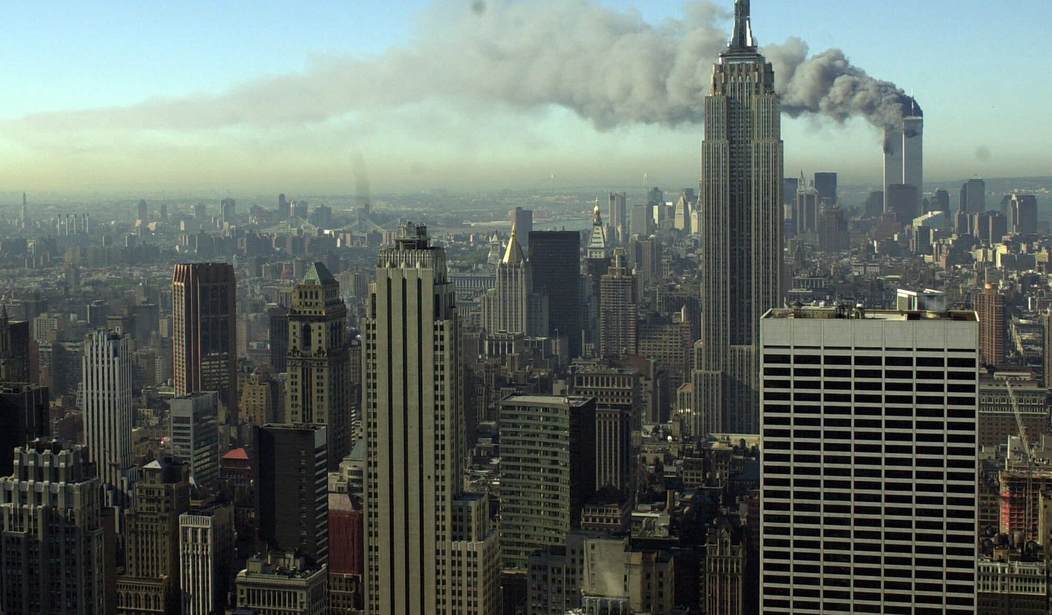In the immediate aftermath of the attack on the Twin Towers, there must have been the hope that September 11 would become a “never again” moment, a mistake not to be repeated, after which the glorious march into the 21st century could be resumed. However, September 11 showed not only that radical Islamism would haunt the new century, but that a burgeoning technology combined with elite nihilism could produce threats from seemingly out of nowhere.
If the planes hitting buildings were that September’s top note, biological warfare was clearly the middle note. “The 2001 anthrax attacks, also known as Amerithrax from its FBI case name, occurred … one week after the September 11 attacks. … According to the FBI, the ensuing investigation became ‘one of the largest and most complex in the history of law enforcement.'” Although Bruce Edwards Ivins, a scientist at the government’s biodefense labs at Fort Detrick in Frederick, Md., was believed by the FBI to be the sole culprit, that conclusion was subsequently challenged.
Sometimes fiction predicts what bureaucrats fail to forecast. Tom Clancy predicted an attack similar to 9/11 in his 1994 book Debt of Honor, but he also sketched out something similar to the anthrax attack in his 1996 Rainbow Six. The story describes a “master plan to wipe out the majority of the human race, called ‘the Project’. Dr. John Brightling, a staunch environmentalist who heads a biotechnology firm called the Horizon Corporation … plans to launch a sophisticated bioweapon attack … The ‘chosen few’, having been provided with the real vaccine, would then inherit the emptied world, convinced of their justification for mass murder as ‘saving the world’ from the encroachment of destructive humanity.”
The Debt of Honor scenario may have initially eclipsed that of Rainbow Six, but nearly two decades after September 11 with the news cycle filled with stories of race wars and apocalyptic environmentalism, the latter may prove more prescient. Even as the era of “small wars” is seemingly on the wane, environmental concerns, especially among the elite, are rising to panic bordering on despair. Sixteen-year-old climate activist Greta Thunberg, speaking at the World Economic Forum Annual Meeting at Davos, said without batting an eye that “adults keep saying we owe it to the young people, to give them hope, but I don’t want your hope. I don’t want you to be hopeful. I want you to panic. I want you to feel the fear I feel every day.”
A gizzard-churning fear has gripped climate activists. Jonathan Franzen writing in the New Yorker says it’s already too late for most people. “During the Protestant Reformation … ‘end times’ was merely an idea, not the horribly concrete thing it is today.”
“There is infinite hope,” Kafka tells us, “only not for us.” This is a fittingly mystical epigram from a writer whose characters strive for ostensibly reachable goals and, tragically or amusingly, never manage to get any closer to them. But it seems to me, in our rapidly darkening world, that the converse of Kafka’s quip is equally true: There is no hope, except for us.
I’m talking, of course, about climate change … every one of the world’s major polluting countries institute draconian conservation measures, shut down much of its energy and transportation infrastructure, and completely retool its economy … overwhelming numbers of human beings, including millions of government-hating Americans, need to accept high taxes and severe curtailment of their familiar life styles without revolting. They must accept the reality of climate change and have faith in the extreme measures taken to combat it … Every day, instead of thinking about breakfast, they have to think about death.
They are convinced not even modern civilization itself will survive the pyre of climate change. Nor are these ideas confined to fringe activists. Elizabeth Warren, a leading Democratic Party candidate for president, tweeted that “on my first day as president, I will sign an executive order that puts a total moratorium on all new fossil fuel leases for drilling offshore and on public lands. And I will ban fracking—everywhere.”
Some are willing to sacrifice their children to the planet. Damian Carrington, environmental editor of the Guardian, writes: “The greatest impact individuals can have in fighting climate change is to have one fewer child … Having one fewer child will save 58.6 tonnes of CO2-equivalent per year.” And to sacrifice the children of others. Bernie Sanders has promised to fund abortions in the Third World to combat global warming.
Yet if the premises of climate catastrophe are accepted — and no divine injunction against taking human life is admissible — why exactly are the actions of a hypothetical Horizon Corporation not the logical response? After all, each person eliminated will save 58.6 tonnes of CO2-equivalent per year. Squeamishness may act as a temporary restraint, but squeamishness can be overcome. As Camus pointed out, there is little defense in purely secular thought against “rational terror” against murder in a good cause.
One environmentalist sect, the eco-fascists, has already demonstrated a definite lack of squeamishness. Tess Owen writes about “Eco-Fascism: the Racist Theory That Inspired the El Paso and Christchurch Shooters. Both believed immigrants were destroying the environment, a racist trope that’s gaining steam among white nationalists.”
The El Paso shooter, who killed 22, claimed in his manifesto that the “decimation of the environment” through “urban sprawl” was endangering future generations in the U.S — and that immigrants, encouraged by corporations, were responsible. He said the way to protect the environment was “to decrease the number of people in America.” The Christchurch shooter, an Australian national, labelled himself an “eco-fascist” in his own manifesto, which he defined as “ethnic autonomy for all peoples with a focus on preservation of nature and the natural order.”
Of course these are deranged heretics in the broader context of the environmental movement, but so too was al-Qaeda with respect to the “religion of peace.” Hell is never far when fanatics are determined to create heaven on earth, especially when technology is available to apparently make their visions come true. The tailored bioweapons of Rainbow Six may come into existence some time in the 21st century if they do not exist already. When they do, what better weapon to level not just at two towers, but all the sinful spires of Earth?
With the passage of time it is natural to think of 9/11 as an event in the past, but in 2001 Rick Rescorla, a security chief at Morgan Stanley Dean Witter, wisely saw the original 1993 attack as a warning for the future, and perhaps September 11 itself is the same. “Mr Rescorla survived the 1993 car bomb attack on the World Trade Center, but later became one of very few people who realized how vulnerable the skyscraper could be to a terror atrocity. He became so convinced that the banking firm, at his insistence, started running drills every three months on how to get thousands of staff from the company’s offices – which covered 40 floors of the South Tower and a site nearby – out as quickly as possible.”
The main ground of hope is that the future essentially consists in what we do not yet know. The principle basis of despair is the belief that we know what the future will be already. Rick Rescorla saved thousands because he believed nothing was written. In retrospect, our new modern age began on September 11, 2001. The 21st century has come but not gone.
Follow Wretchard on Twitter
Tipjar at wretchard.com
Support the Belmont Club by purchasing from Amazon through the links below.
Books:
The Scandal of Money: Why Wall Street Recovers but the Economy Never Does, by George Gilder. In this book, Gilder unveils a radical new explanation for America’s economic woes and shows how a small cabal of elites have manipulated currencies and crises to stifle economic growth and crush the middle class.
Scipio Africanus: Greater Than Napoleon, by B.H. Liddell Hart. The classic biography of Rome’s greatest general and the victor over Rome’s greatest enemy, Hannibal.
On Desperate Ground: The Marines at The Reservoir, the Korean War’s Greatest Battle, by Hampton Sides. This is Sides’s version of this epic clash at the frozen shores of the Chosin Reservoir, based on fresh research, unpublished letters, declassified documents, and interviews with Marines and Koreans who survived the siege. Faced with probable annihilation, and temperatures plunging to 20 degrees below zero, the surrounded, and hugely outnumbered, Marines fought through Chinese enemy forces with ferocity, ingenuity, and nearly unimaginable courage as they marched their way to the sea.
Ottolenghi Simple: A Cookbook, by Yotam Ottolenghi. 130 streamlined recipes packed with Ottolenghi’s signature Middle Eastern–inspired flavors, all simple in at least (and often more than) one way: made in 30 minutes or less, with 10 or fewer ingredients, in a single pot, using pantry staples, or prepared ahead of time for brilliantly, deliciously simple meals.
For a list of books most frequently purchased by readers, visit my homepage.
Did you know that you can purchase some of these books and pamphlets by Richard Fernandez and share them with your friends? They will receive a link in their email and it will automatically give them access to a Kindle reader on their smartphone, computer or even as a web-readable document.
Open Curtains by George Spix and Richard Fernandez. Technology represents both unlimited promise and menace. Which transpires depends on whether people can claim ownership over their knowledge or whether human informational capital continues to suffer the Tragedy of the Commons.
The War of the Words, Understanding the crisis of the early 21st century in terms of information corruption in the financial, security and political spheres
Rebranding Christianity, or why the truth shall make you free
The Three Conjectures, reflections on terrorism and the nuclear age
Storming the Castle, why government should get small
No Way In at Amazon Kindle. Fiction. A flight into peril, flashbacks to underground action.
Storm Over the South China Sea, how China is restarting history in the Pacific.










Join the conversation as a VIP Member